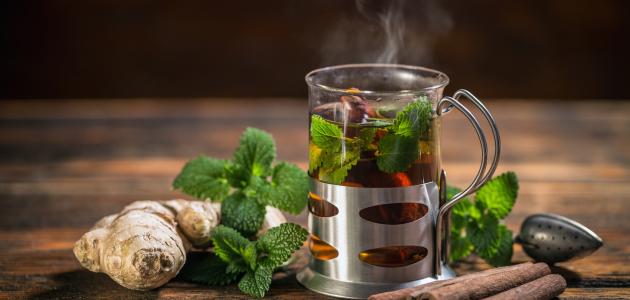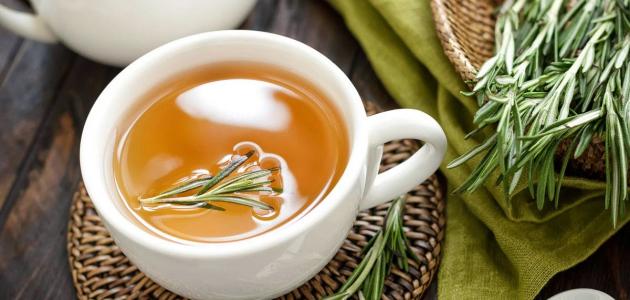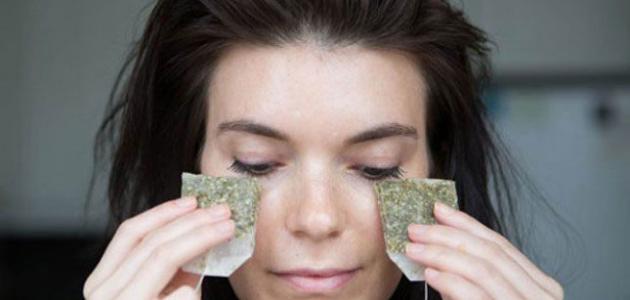Contents
Green tea and ginger
Both green tea and ginger give great benefits to human health, as the health benefits of green tea have been known since ancient times, and then modern scientific research began to pay attention to it. Green tea is prepared from the leaves of the tea plant, which bears the scientific name Camellia sinensis, by drying and evaporating its leaves without oxidation of the polyphenols present in them, as the heat works to inhibit the activity of the enzyme oxidizing them in the tea (1) .
As for ginger, known scientifically as (Zingiber officinale), it is one of the most widely used herbs in the world. As it is used as a spice in preparing food, in addition to its therapeutic uses (3) , (7) , and it has also been used in folk medicine since ancient times in many civilizations (5) , and it contains many active substances, the most prominent of which are gingerol and chagoul (4) .
Green tea with ginger combines the benefits of both at the same time, and therefore it is considered a distinctive beverage from a health point of view. In this article, we will talk about the most important health benefits of each.
Benefits of green tea with ginger
In the following, we will mention the benefits of green tea and ginger separately, which are combined with green tea with ginger.
Benefits of green tea
Recent scientific research has found that green tea conferring many health benefits due to its caffeine, theophylline, volatile oils and polyphenol compounds (1) . Its health benefits include the following:
- Caffeine contributes to stimulating alertness, improving connectedness of thoughts, and combating feelings of fatigue, and theophylline contributes to some of these roles (1) .
- Green tea is used in ancient Chinese medicine to treat headaches, relieve body pain, digestive problems, depression and remove toxins from the body, and it is also used as a stimulant and as a prescription to extend life (1) .
- Thiamine increases mental activity, strengthens heart muscle contraction and relaxes blood vessels, stimulates diuresis more than caffeine, and also stimulates breathing (1) .
- Green tea contains many antioxidants in high concentrations, which makes it an important role in raising the level of oxidative resistance and reducing oxidative stress in the body, which slows down cell aging (1) .
- Green tea contributes to protecting genes from the changes that can occur due to smoking, and it also increases the activity of enzymes that rid the body of carcinogens (2) . It was found that consuming green tea reduces the risk of many types of cancer, such as lung and colon cancer. , Esophagus, mouth, stomach, small intestine, skin, lung, kidneys, pancreas, mouth, esophagus, lactic glands, prostate, and others (1) .
- Green tea helps regulate normal cell growth and death (1) .
- Green tea stimulates the growth of beneficial bacteria that live in the digestive system (1) .
- Green tea helps fight inflammatory metabolites that increase the risk of cancer (1) .
- Green tea contributes to lowering high blood pressure and cholesterol, and it also contributes to raising the level of good cholesterol (1) .
- Green tea intake reduces the risk of developing atherosclerosis and coronary artery disease (1) .
- Several studies have found that consuming unsweetened green tea reduces the risk of tooth decay, and it has also been found to reduce the chance of gum disease, tooth loss and oral cancer (1) .
- Some studies have found that consuming green tea increases calorie burning and contributes to weight loss (1) .
- Some studies have found that consuming green tea contributes to lowering blood glucose and insulin levels, in addition to lowering triglycerides in cases of diabetes (1) .
- Drinking green tea increases your water intake, and is a good source of many vitamins and minerals (3) .
- Green tea contributes to resistance to many types of bacteria and viruses, including Helicobacter pylori, which causes ulcers (1) , (2) , influenza virus in its early stages, herpes simplex virus (herpes simplex), and adenovirus (31) .
- Green tea helps fight some fungi (1) and (2) .
- Green tea improves bone density and reduces the risk of fractures (1) , (2) .
- Green tea reduces the risk of developing fibrosis that affects the liver, skin, and arteries (1) .
- Green tea helps stimulate immunity (1) .
- Some studies suggest that green tea reduces the risk of developing Parkinson's, Alzheimer's, and some other neurological diseases (1) .
- Some studies have found an inverse relationship between green tea intake and the formation of kidney stones (1) .
- Green tea can play a role in alcohol poisoning (1) .
Benefits of Ginger
Drinking ginger tea provides the following benefits:
- Inflammation resistance (3) .
- Reducing symptoms of dizziness, which include nausea (6) .
- Reducing the symptoms of nausea and vomiting caused by many cases, which include post-operative cases by about 24 hours (6) , chemotherapy, and motion sickness, but the results of scientific research differed in its last two cases (5) .
- Ginger helps relieve menstrual pain when taken during menstruation (6) .
- Ginger reduces arthritis pain in osteoarthritis (6) .
- Ginger improves worm movement in the digestive system (7) .
- Ginger helps with nausea and vomiting in early pregnancy, but a doctor should be consulted before consuming it during pregnancy (6) , as some people think that taking it in high doses can increase the risk of miscarriage (5) .
- Ginger stimulates the immune system (7) .
- Ginger helps relieve rheumatic pain, joint and muscle pain, and headaches (5) .
- Some studies suggest a role for ginger as an antimicrobial (4) .
- Ginger can protect genes from the toxic changes that can be caused by some toxins (4) .
- Some studies have found that ginger contributes to fighting cancer, but this effect needs more scientific research (3) .
- Ginger can help reduce weight and fight obesity, and this effect needs more scientific proof (4) .
- Some studies have found ginger has a role in lowering blood sugar and cholesterol (4) .
- Ginger can play a role in preventing Alzheimer's disease, but this effect also needs more scientific research (4) .
- Ginger can improve symptoms of an upset stomach (6) .
- Ginger can contribute to muscle pain after exercise (6) .
- Some studies have found ginger a role in improving acute respiratory failure (6) .
- Ginger may improve appetite loss (6) .
- Ginger can improve cold and flu symptoms (6) .
- Some studies have found that ginger can improve swallowing ability after stroke (6) .
References
(1) Adapted from an article by Cabrera C., Artacho A., and Gemenez R. (2006) Beneficial Effects of Green Tea — A Review Journal of the American Collage of Nutrition / 25/2 / PAges 79-99.
(2) Adapted from the article by Chacho SM et al. (2010) Beneficial Effects of Green Tea: A Literature Review Chinese Medicine / 5/13.
(3) Acting on the article of Attari VE et al. (2015) Changes of Serum Adipocytokines and Body Weight Following Zingiber Officinale Supplementation in Obese Women: a RCT European Journal of Nutrition / E-publication ahead of print.
(4) Acting on the article by Mishra RK, Kumar A., and Kumar A. (2012) Pharmacological Activity of Zingiber officinale International Journal of Pharmaceutical and Chemical Sciences 1/3 / Pages 1422-1427.
(5) Acting on the article WebMD / Ginger / 2015 / www.webmd.com/vitamins-and-supplements/ginger-uses-and-risks.
(6) Acting on article WebMD / Ginger / 2009 / www.webmd.com/vitamins-supplements/ingredientmono-961-ginger.aspx?activeingredientid=961.
(7) By disposing of the book Fleming T. / PDR for Herbal Medicines / 2nd Edition / Medical Economics Company / Montvale 2000 / Pages 339-341.








